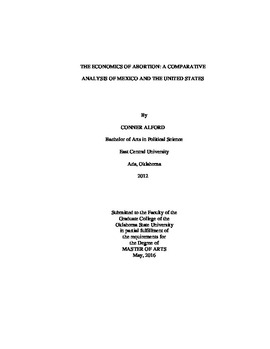| dc.contributor.advisor | Towsend-Bell, Erica | |
| dc.contributor.author | Alford, Conner O'brien | |
| dc.date.accessioned | 2017-02-22T22:13:28Z | |
| dc.date.available | 2017-02-22T22:13:28Z | |
| dc.date.issued | 2016-05-01 | |
| dc.identifier.uri | https://hdl.handle.net/11244/49030 | |
| dc.description.abstract | An extensive body of literature suggests that abortion is a normal economic good and that legal restrictions may reduce the rate at which it occurs by increasing its cost relative to alternative forms of family planning or to unwanted childbirth. However, this expectation is challenged by supranational data showing that developing regions tend to exhibit rates of abortion similar to those observed in more developed parts of the world despite having generally more restrictive laws. This article seeks to explain these seemingly contrary observations by arguing that the ability of legal restrictions to reduce the rate at which abortions occur depends in part on the national and economic contexts within which they operate. Legal restrictions tend to be less effective in countries where economic circumstances reduce the affordability of abortion alternatives such as family planning prior to an unplanned pregnancy or unwanted childbirth because it becomes harder to adequately incentivize women to incur the costs entailed by choosing these options. This theory is ultimately tested and largely substantiated by a comparative analysis of the United States and Mexico. Results indicate that legal restrictions are an effective way to reduce abortion in the developed world but that they may not be in middle or lower income countries. Secondary analyses indicate that more restrictive abortion policies do not increase maternal mortality, but that they do reduce overall levels of sexual activity in developed countries. Taken together these findings suggest that while economic models of fertility control are largely applicable to countries like the United States, new theories are necessary in order to explain abortion in the developing world. | |
| dc.format | application/pdf | |
| dc.language | en_US | |
| dc.rights | Copyright is held by the author who has granted the Oklahoma State University Library the non-exclusive right to share this material in its institutional repository. Contact Digital Library Services at lib-dls@okstate.edu or 405-744-9161 for the permission policy on the use, reproduction or distribution of this material. | |
| dc.title | Economics of Abortion: A Comparative Analysis of Mexico and the United States | |
| dc.contributor.committeeMember | Vinson, Laura T. | |
| dc.contributor.committeeMember | Herrick, Rebekah | |
| osu.filename | Alford_okstate_0664M_14615.pdf | |
| osu.accesstype | Open Access | |
| dc.description.department | Political Science | |
| dc.type.genre | Thesis | |
| dc.type.material | text | |
